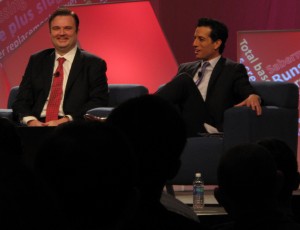The 2012 Sloan Sports Analytics Conference, a.k.a. "Dorkapalooza"
-
-
slice.mit.edu
Filed Under
Recommended
If so, the 2012 MIT Sloan Sports Analytics Conference was the place for you.
Founded by Daryl Morey MBA ’00, general manager of the NBA's Houston Rockets, and nicknamed “Dorkapalooza” by ESPN sportswriter Bill Simmons, the conference covered topics from concussion treatment breakthroughs to the science of sports bookmaking and gambling.
Now in its sixth year, the 2012 conference featured over 2,200 attendees that included representatives from 73 professional sports teams, with over 70 panels and presentations blanketing two days.
Quotes from the some of the conference's most candid panelists are below.
Actor and game show host Drew Carey, a minority owner of Major League Soccer’s Seattle Sounders, brought a unique perspective. Every four years, the Sounders allow their fans to vote out or keep the team’s general manager.
“If you can vote for a president and mayor, you can vote for a general manager. Every other job in America requires performance and accountability to keep your job, so why shouldn't a general manager have the same rules? A lot of owners don't care if they win or not. They're just in it to make money.”Rob Manfred, Major League Baseball executive vice president, spoke about the evolution of professional sports leagues and today’s emphasis on boardroom analytics.
"Today, analytic people are more important than lawyers. Economics are now the most important part of a basic agreement between teams and players. If you spend more than you’re generating, it’s unsustainable. We need a full understanding of financials, as a way of deciding an appropriate share."Brian Burke, general manger of the NHL’s Toronto Maple Leafs, is a noted dissenter of “Moneyball,” the term used to describe the analytical approach to assembling a sports team, but was a conference favorite nonetheless.
“Everybody is looking for these Moneyball breakthroughs. I have yet to see anything that has value in terms of an alternative way of evaluating players. Nobody has ever won a championship with Moneyball. There's more to this than looking at statistics and picking players out of a [expletive] hat.”Burke succinctly described his negotiating strategy during the "Art & Analytics of Contract Negotiation" panel.
"I try to be a [expletive] all the time."ESPN basketball analyst John Hollinger discussed the difficulty of communicating the value of statistics to teams.
"Statistics as a coaching tool and as a communications tool are completely different. What you learn, and how you teach it, is critical. There's a huge difference between analyzing data and implementing it."NBA analyst and former head coach Jeff Van Gundy humorously stressed the importance of analytics in coaching, to a certain extent.
“If I wanted to make a change when I was a coach, I’d find numbers to support that change…or I’d just make it up. Players don’t know the difference. As a coaching tool, statistics are different. I wouldn’t tell a guy, 'You’re a 38 percent shooter after four dribbles, so dribble a fifth time, where you’re at 40 percent.'”Tomorrow’s post will focus on the MIT effect at the conference, and the MIT-affiliated panelists, researchers, and attendees.









